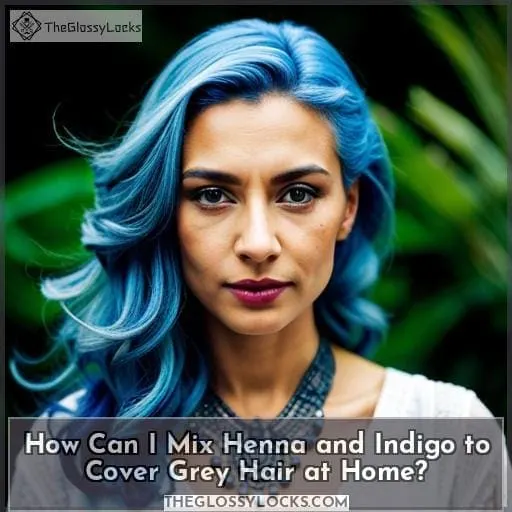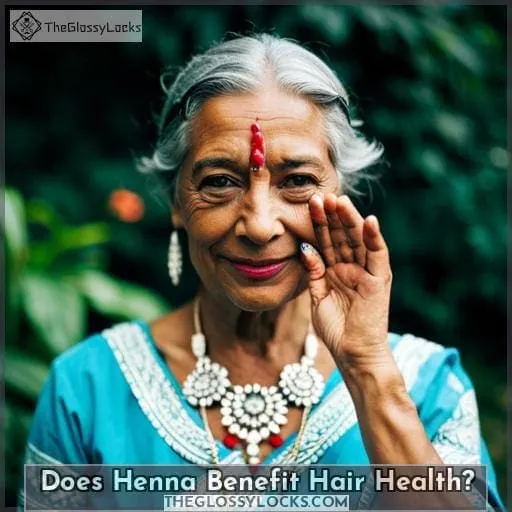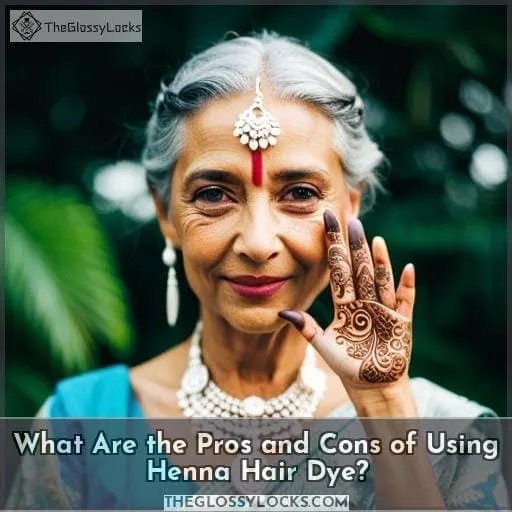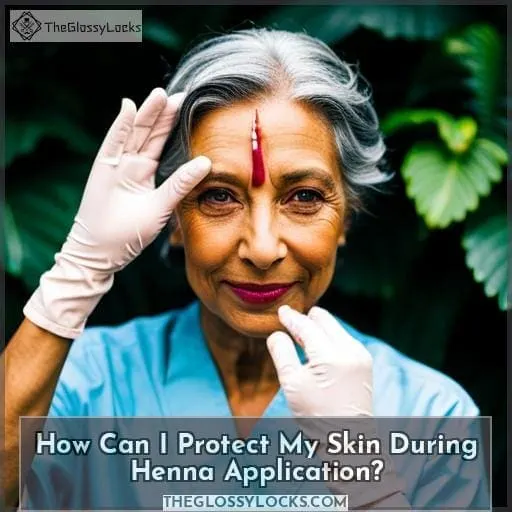This site is supported by our readers. We may earn a commission, at no cost to you, if you purchase through links.
Covering gray hair can be a daunting task. But with the right product and technique, it doesn’t have to be! Henna is an all-natural alternative to traditional dyes that won’t damage your hair or leave you with harsh chemicals on your scalp.
To get optimal coverage for gray hairs when using henna, adding developer helps set the henna into each individual strand of hair for longer-lasting results. In this article, we will cover what exactly henna is and how developer helps it achieve a more vibrant color on gray hairs.
Table Of Contents
- Key Takeaways
- What is Henna and How Does It Cover Grey Hair?
- How Does Developer Help Henna Cover Grey Hair?
- How Much Developer Do I Need to Use With Henna to Cover Grey Hair?
- Can Henna Cover Grey Hair in a Single Use?
- What Are the Best Types of Henna to Cover Grey Hair?
- How Can I Mix Henna and Indigo to Cover Grey Hair at Home?
- Does Henna Benefit Hair Health?
- What Are the Pros and Cons of Using Henna Hair Dye?
- How Can I Protect My Skin During Henna Application?
- Frequently Asked Questions (FAQs)
- Conclusion
Key Takeaways
Adding a developer to henna helps to set the dye into each hair strand, resulting in longer-lasting color. Different hair types may require varying amounts of developer, typically around 15 drops per 25 grams of henna powder.
Mixing henna and indigo together can create a black or dark brown tint that effectively covers gray hair.
What is Henna and How Does It Cover Grey Hair?
Henna is a natural dye that can give your hair strength, shine, and color. It can even cover grey strands with an orangish-red hue. The dyeing process starts by mixing henna powder with developer, which contains hydrogen peroxide to help set the henna into the hair strand for longer-lasting results.
Application tips are important when using this product. Use a shower cap to cover your head after applying the mixture and leave it on for 4 hours before washing off with plain water. Different types of hair may require different amounts of developer. Typically, around 15 drops per 25 grams of powder is recommended.
Color options include black henna or indigo powder added to naturally create darker shades such as browns and blacks without damaging your locks! Product reviews will provide helpful information about which products work best for specific types of hair so you know what sort of end result you can expect from each one based on other customers’ experiences.
Henna mixtures come in many forms, from pre-made mixes up to creating them yourself at home using coffee powders, lukewarm water plus an optional indigo mix if needed! Whichever way you choose, just remember that adding too much developer won’t be necessary because it could cause damage while leaving behind a dark orangish-red tint instead!
Go forth confidently knowing there’s still plenty more research out there, but no matter what, always make sure safety comes first when experimenting with any type of hair dye
How Does Developer Help Henna Cover Grey Hair?
Adding developer to your henna mix helps intensify the color, creating a more dramatic and longer-lasting result when covering gray hair. Developer contains hydrogen peroxide, which is known for its ability to set a dye into the hair strand.
Depending on the brand, you may need around 15 drops of developer with every 25 grams of henna powder you use to get optimal results with coloring techniques that involve black or natural hennas, as well as indigo proportions.
With this combination, lasting results are achievable without any chemical reactions taking place due to the natural process involved in treating gray hairs with henna dye mixes and developers alike.
How Much Developer Do I Need to Use With Henna to Cover Grey Hair?
To achieve the darkest and longest-lasting color on gray hair, use approximately 15 drops of developer per 25 grams of henna powder to intensify the dye. Ratios for mixing henna with indigo vary depending on desired results, but overall application remains relatively similar.
Before beginning a henna application, ensure that the product does not contain any metallic salts as they may react with other dyes in an undesirable way or cause difficulty removing it from your hair later on.
Henna is excellent for covering graying hair in a single use and provides conditioning benefits to give you stronger, thicker locks without damaging them like other chemicals would.
Using warm water when making your mix ensures that all ingredients blend together well for optimal performance during application and after washing out too! Henna can also serve as a permanent replacement for regular chemical dyes.
Can Henna Cover Grey Hair in a Single Use?
You can use henna to permanently replace chemical dyes and obtain a dark orangish-red hue that will cover your grays in a single application. When selecting the right dye, make sure you know the oxidation rate of your particular brand of henna as this will determine how long it needs to be left on for optimal results.
Pre-mixing is recommended so that all ingredients are well incorporated before applying it onto hair. It’s also important to protect the skin with thick balm or cream prior to application, as henna has been known to stain easily if not fully removed from the skin after rinsing off.
Hair maintenance is necessary when using natural products such as henna dye. Regular oil treatments should be included in your haircare routine for optimum color longevity and healthy hair structure over time.
Henna powder can provide grey coverage in one single usage, but ensure you select high-quality products accordingly depending on the desired shade outcome.
With proper care and selection, you’ll achieve desirable hair color without damaging effects from harsh chemicals found within traditional dyes, making this natural product ideal for covering grey strands safely at home!
What Are the Best Types of Henna to Cover Grey Hair?
Choosing the right type of henna for your hair can transform gray strands into a vibrant, beautiful color with incredible intensity – it’s like magic! To get the best results when covering grey hair with henna, preparation is key.
Start by selecting a natural henna dye that does not contain metallic salts. Then, prepare an appropriate amount of powder based on your desired coverage.
The application process requires patience and precision to ensure even distribution throughout all gray hairs. Taking extra care to protect skin from staining during this step is also important! For first-time users, bleaching tips may be beneficial in order to lighten existing dark colors before applying the dye mixture as well as promoting better adherence and longer lasting effects over time.
Additionally, using henna offers countless other benefits such as improved scalp health due to its natural properties which help keep moisture locked in.
How Can I Mix Henna and Indigo to Cover Grey Hair at Home?
Mixing henna and indigo together can give you a black or dark brown tint to cover your gray hair at home. To do this effectively, start by purchasing organic henna powder that does not contain any metallic salts, like Morrocco Method or Lush brands.
Then make two separate mixtures – the first of coffee and water for the henna paste with a thick consistency; then lukewarm water for an indigo mixture if desired. Combine these two pastes together just before applying to washed and dried hair in order to maximize color intensity on grey strands.
Protect your skin from staining with a balm or cream before beginning the application process, and wear old clothing during the dyeing session since it can be messy! Allow 4 hours of processing time before washing out with plain warm water only – no shampoo necessary!
Henna will leave your locks naturally conditioned while avoiding harsh chemicals found in regular dyes, which can be damaging over long-term use, resulting in healthier-looking tresses overall!
Does Henna Benefit Hair Health?
Using henna to dye your hair can help restore its natural pH balance and promote overall better hair health. It adds color variations, softer texture, and acts as a good conditioner for the hair. Henna also provides long-lasting results that traditional dyes cannot achieve. As an all-natural option, henna is free from chemicals and will not damage the scalp or cause irritation like other harsh products used in salons.
Adding developer helps set the henna into the strands of grey hairs to intensify coloring, making it a better option than regular dyes for covering gray hairs.
Henna benefits go beyond simple coloring. It can keep your scalp healthy by balancing out oil production on both oily or dry scalps while providing essential vitamins needed for healthy growth of strong locks of hair!
What Are the Pros and Cons of Using Henna Hair Dye?
For you, henna hair dye offers the benefit of natural and long-lasting color with some potential drawbacks. These drawbacks include messiness during application and difficulty changing colors. However, with superior quality ingredients, henna can help restore your hair’s pH balance while also promoting healthier hair overall.
Its permanent coloring properties provide lasting effects that are hard to achieve with traditional dyes.
The application process is not too complicated. All you need is an optional developer solution to intensify the henna color on gray hairs for more vibrant coverage. However, caution must be taken when using metallic salts in the mix as they may cause chemical reactions with other dyes if used improperly or without proper mixing instructions followed beforehand.
Henna does have some cons, such as staining skin during application and having difficulties going lighter after applying. However, these drawbacks do not outweigh its advantages in terms of ease of use and unparalleled results when compared to conventional methods.
How Can I Protect My Skin During Henna Application?
Before applying henna, protect your skin with a thick balm or cream to prevent messiness. It is recommended to mix indigo powder into the henna mix to achieve a blacker or dark brown tint on gray hair instead of an orange-reddish color.
Lemon juice is often added to help set the dye and restore pH balance in hair and scalp for more even coloring results. There are many brands of henna dyes available, including Morrocco Method, which does not include metallic salts that could cause chemical reactions when mixed with other dyes.
To minimize staining during application, make sure to shower beforehand and dry off completely. This will help keep any excess dye from dripping onto your forehead or floor while it’s developing over 1-6 hours depending on brand instructions.
It is important to use gloves throughout the whole process as well. Once it’s time to wash off, there should be minimal mess left behind due to its natural nature without using harsh chemicals like traditional hair colors do.
Frequently Asked Questions (FAQs)
How long does henna last on grey hair?
Henna on grey hair typically lasts between 4 and 6 weeks, offering long-lasting color with less maintenance. It may be difficult to achieve a lighter hue after application, so it’s important to consider your desired shade before beginning the process.
Is henna a permanent hair dye?
Yes, henna is a permanent hair dye. It can last for up to six weeks before needing another application and can cover gray hair in one use with the help of a developer.
Does henna block out other hair dyes?
Yes, some henna dyes have metallic salts added, which can interfere with other hair dye applications.
Can I mix different types of henna together?
Yes, you can mix different types of henna together. However, it is important to be aware that the results may vary depending on the type and quality of each henna used. Mixing indigo with natural or black henna powder will give a darker color result than using one type alone.
What is the texture of henna when mixed?
When mixed, henna has the texture of mud. It can be difficult to apply and may drip during application.
Conclusion
To sum up, using henna to cover grey hair is a safe and natural alternative to traditional hair dyes. It can provide long-lasting color, restore the natural pH balance, and even improve hair health. It’s crucial to use the appropriate amount of developer and the right type of henna to ensure that the color lasts.
With a little bit of practice and patience, you can be confident that your grey hair will be concealed for good.













